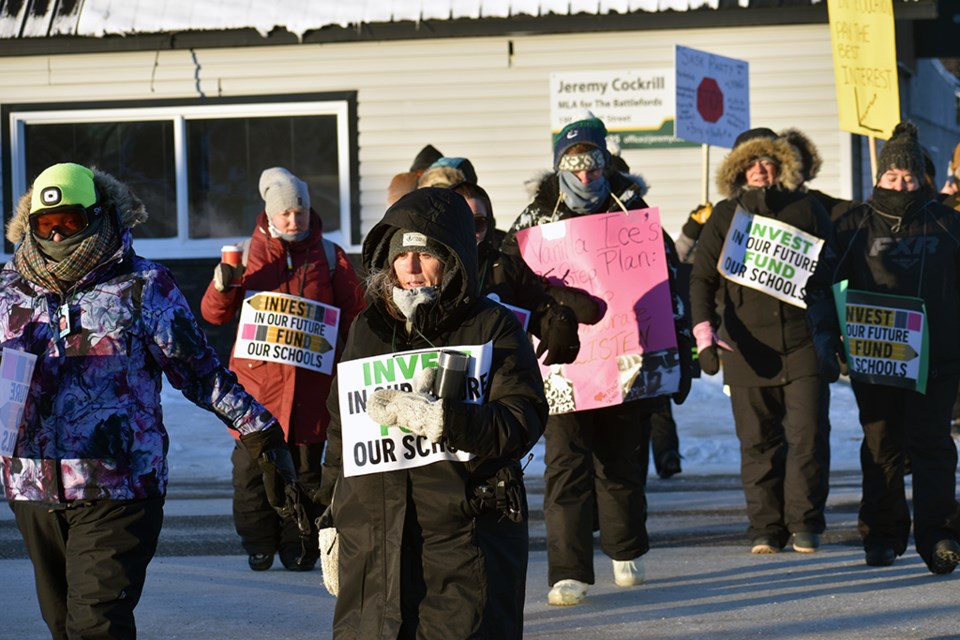THE BATTLEFORDS — Marching in clouds of hot breath and bundled in winter wear while braving icy winds and frigid temperatures, Saskatchewan's teachers ground the province's classrooms to a halt on Jan. 16 during the first one-day strike in over a decade.
In North Battleford, over 400 teachers from three school divisions marched along 100th Street in-front of Minister of Education Jeremy Cockrill's office to voice their displeasure with the government's inadequate funding.
"We're out here fighting for increased funding to education to help students," Micheal Hagal, member of the Saskatchewan Teachers' Federation (STF) executive told SASKTODAY.ca.
"That's that's our big thing in this is to get education funding to where it once was so that education is better for students, to give them the education they once received in Saskatchewan."
The STF has been doing battle with the province for months over various concerns ranging from a lack of educational assistants to classroom complexity, with 95 per cent of teachers voting in favour of sanctions on Oct. 27, 2023.
Though Minister Cockrill was not visibly in attendance, when the STF announced the strike on Jan. 12 he said that he was disappointed, and was hoping teachers would return to the table.
"We're willing to be at the table but they need to bring more than no's, so if they're willing to discuss class composition we'll be back at the table in a heartbeat," Hagal said.
When asked about the next step after the STF's one-day strike, he said although he wasn't on the bargaining committee the next step isn't clear.
"There's lots of plans in place for what the next step will be, it's not for sure, it's kinda a fluid thing we'll have to see what the response is and the bargaining team will decide where to go from there.
"This is amazing to see so many teachers out here on a very cold day but we're ... out here because we're passionate about education, we're passionate about kids," he said.
One teacher from the Battlefords who teaches at Battleford Central School, said she's hoping to get more funding to support more EAs and a decrease in classroom sizes.
"I'm out here to support my students," Hope Jeffery said, adding that this year is marks the smallest classroom she's had with 27 students.
When asked how teachers cope with classrooms of that size, she said,
"You honestly don't. You go in and do the best you can and hope that you can meet everybody's needs but the reality is when you have such a diverse group with so many students kids get left behind no matter how hard you try.
"And it's really unfortunate to see that and it's heartbreaking knowing that not all your students are getting what they deserve."
Another teacher, Rhonda MacDonald from North Battleford Comprehensive High School, was out to stress the importance of the public education system and to make sure it's equitable.
"I've been a teacher for 17 years and through the last 17 years I've noted a decline in education," she said, referencing a reduction in classes required for graduation and class complexity and sizes.
"Last year I almost quit my teaching job because it was so intense in my classrooms ...I felt like all of my kids were at a loss because I couldn't meet their individual needs.
"I was just tired of having to give them less and less each year and it's frustrating," MacDonald said.
"We're not here for payraises, we're here ... to make sure that kids are going to feel safe, supported, and we just want to people to realize that public education's important.
In comments to the media at the Legislative Assembly, Minister Cockrill said that the government would not be moving further on classroom complexity.
"That is a line in the sand for the government, that we're not going to be moving on. Again, we believe that issues around classroom complexity as best dealt with by school divisions, locally elected school divisions," he said.
"The union's request is to basically take that away from locally led school boards. Which we don't believe is in the best interest of education."




